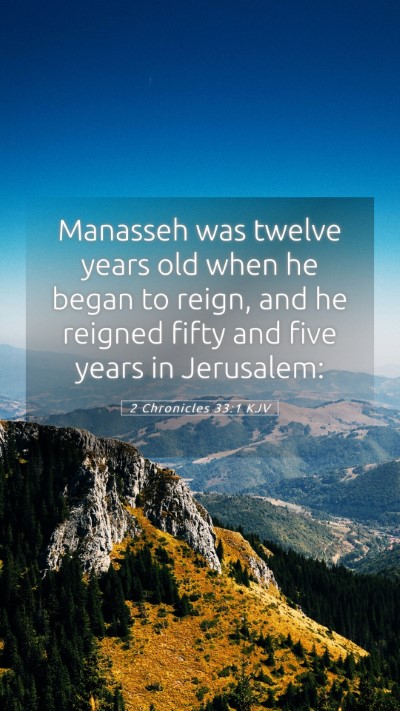Bible Verse Meaning and Commentary on 2 Chronicles 33:1
Overview
2 Chronicles 33:1 states: “Manasseh was twelve years old when he began to reign, and he reigned fifty-five years in Jerusalem.” This verse introduces us to one of the most infamous kings of Judah, highlighting his youth at ascension and the duration of his reign. Let’s explore the meaning of this verse through insights from various public domain commentaries.
Historical Context
The context of 2 Chronicles emphasizes the history of the kings of Judah, particularly focusing on their faithfulness to God. Manasseh's reign is significant due to its juxtaposition against the commands and worship of God laid out in earlier texts. His reign underscores the themes of apostasy, repentance, and divine mercy.
Commentary Insights
-
Matthew Henry's Commentary:
Henry emphasizes the importance of Manasseh’s youth at the time he became king, suggesting that such a young leader was indicative of both potential for growth and risk of poor influence. He notes how Manasseh’s reign marked a troubling period of idolatry and sin in Judah, leading people away from God. Henry also mentions that despite his wickedness, Manasseh’s eventual repentance demonstrated the grace of God and the possibility of redemption.
-
Albert Barnes' Notes:
Barnes highlights the long reign of Manasseh, which provided ample opportunity for both positive leadership and negative influences. He points out the consequences of Manasseh's idolatrous practices and the subsequent judgment that followed. He argues that the mention of his early reign serves as a warning to readers about the effects of poor leadership choices made in youth. Barnes also sees a shadow of hope in the latter part of Manasseh’s life.
-
Adam Clarke's Commentary:
Clarke dives into the chronological implications of Manasseh’s opposition to preceding godly kings. He argues that Manasseh's youthful indiscretion may have contributed to his later infamous actions. Clarke also connects Manasseh's eventual repentance to the broader themes of the possibility of forgiveness and restoration, suggesting this verse serves as both a cautionary tale and a message of hope.
Significance of 2 Chronicles 33:1
This verse serves multiple layers of meaning in the broader Biblical narrative:
- Illustration of Youth: It indicates how a young leader can have impactful choices that resonate through generations.
- Contrast of Leadership: Manasseh’s reign serves as a stark contrast to his father, Hezekiah, emphasizing the volatility of royal influences in Judah.
- Theme of Redemption: Through the trajectory of Manasseh’s life, the narrative communicates the Biblical principle that no one is beyond redemption, aligning with the broader message of grace in Christianity.
- Warning Against Apostasy: His actions caution readers against straying from divine commandments, underscoring the need for vigilance in faith.
Related Biblical Cross References
- 2 Kings 21:1-16: A parallel account of Manasseh’s reign.
- 2 Chronicles 32:33: Regarding Hezekiah’s righteous rule preceding Manasseh.
- Luke 3:33: Mention of Manasseh in the genealogy of Jesus.
Application and Reflection
As we engage with 2 Chronicles 33:1, we find lessons applicable to our personal lives:
- Leadership in Youth: The importance of wise decision-making during formative years.
- God's Mercy: The assurance that repentance is always available, regardless of past transgressions.
- Influence of Legacy: Understanding how our choices will affect those who follow after us.
Conclusion
In exploring the meanings of Bible verses like 2 Chronicles 33:1, we uncover not just a historical account but a rich tapestry of lessons on leadership, repentance, and the immense grace of God. This passage invites deeper Biblical exegesis and personal reflection, providing insights valuable for Bible study groups, personal study, and discussions with Bible study resources.
For a comprehensive understanding of Scripture, particularly difficult passages, consider studying the broader themes and contexts that Scripture offers, utilizing Bible study tools and Bible study guides to navigate these profound truths.


